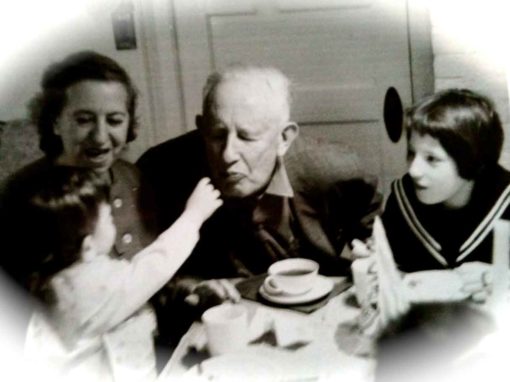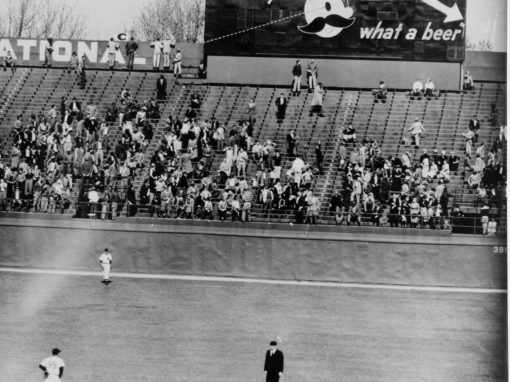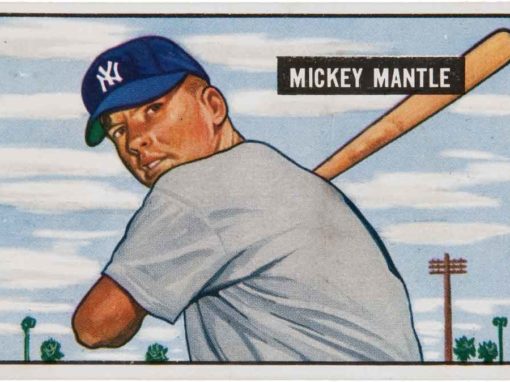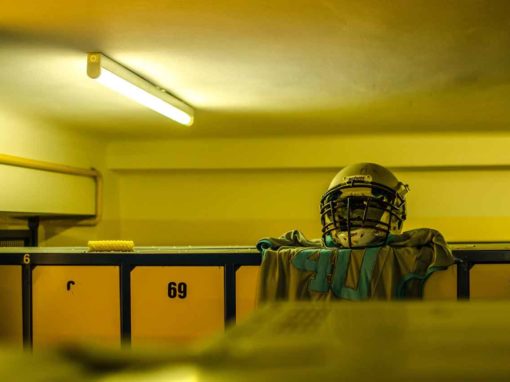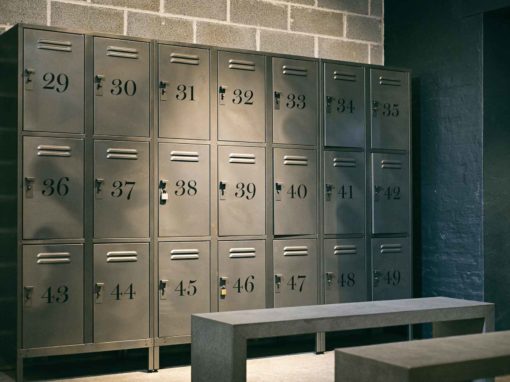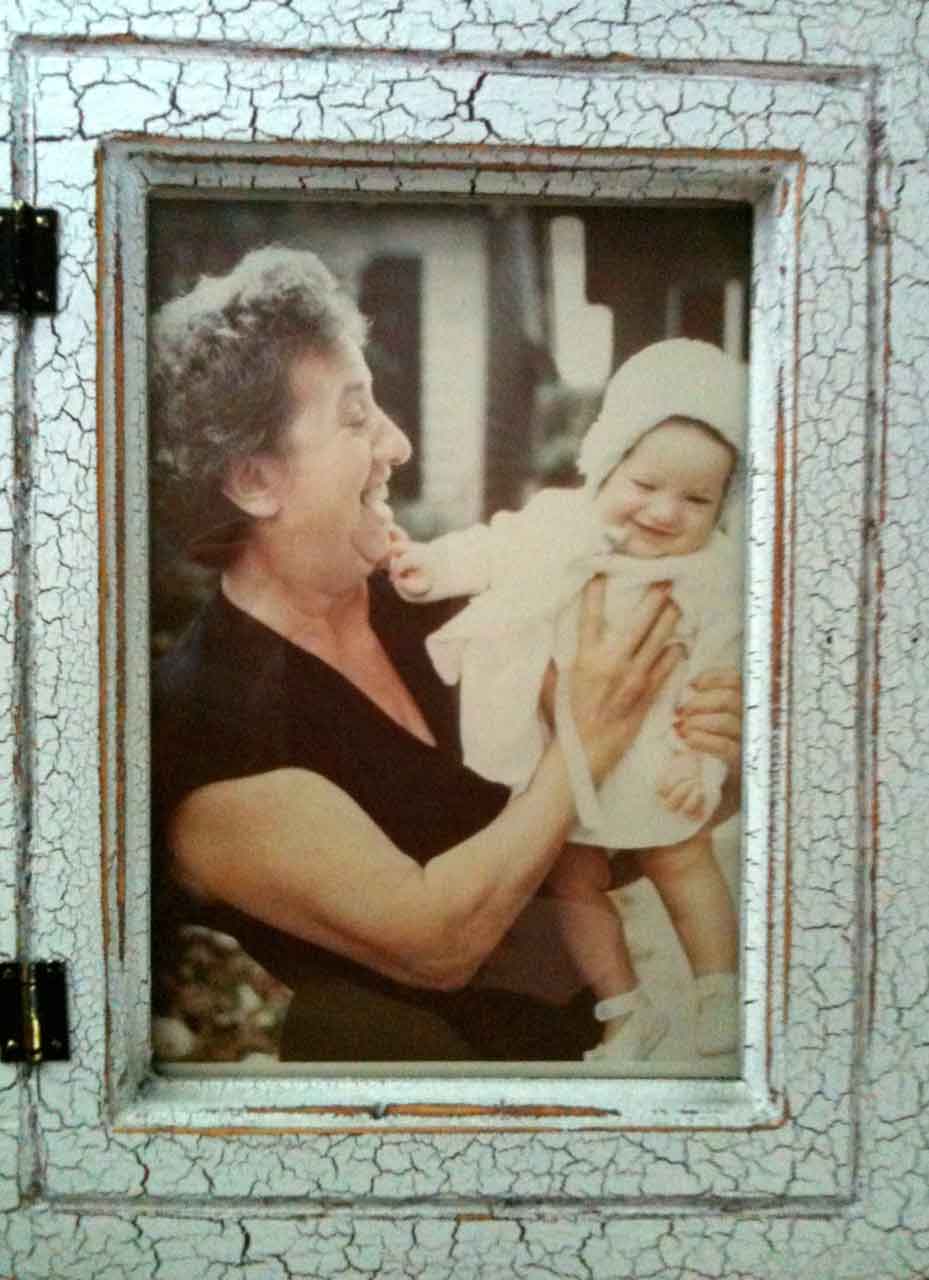Still No Cheering in the Press Box
A new “chapter” in an essay series updating Jerome Holtzman’s 1973 “No Cheering in the Press Box”
Povichcenter.org | 2014
I came out of the womb and I said, “I want to be Red Smith.â€
That was a joke.
My father, who was a very short, fat Jew with great hands at the tennis net, was a water boy for the 1927 New York Football Giants. He got that job because his father Abe, who died long before I was born, was a bookie and rumrunner. He would sit my dad, when he was still a tow-headed little thing, on the back of a rumble seat of a Model T, and he was the decoy when they brought the hooch over the border from Canada.
I believe that through my grandfather’s connections, whoever he was selling all this booze to may have included some members of the ownership of the team somewhere, that’s how my dad got to be the water boy. He ended up with a great game at the net and no serve, he ran cross country at City College when it was still City College, he was a champion ping pong player of the Aleutian Islands, where there was absolutely nothing else to do during WWII.
And then he had two daughters, including my sister, who’s older than me by about 3 ½ years. Paper dolls were big in her side of the house, and so my dad needed a pal. I used to go out with him on Sunday afternoons and listen to Al DeRogatis call the New York football Giants games because my mother hated sports and she would banish him and Al DeRogatis from her parlor. So the only way he could listen to the games was to drive around Long Island all Sunday afternoon. I went with him.
He also grew up in Coogan’s Bluff, and he was one of the many kids who would sit on the rock and watch the games. He was a passionate Giants fan, and when the Giants left town in ’57 he was crushed. He transferred his allegiance and much of his dying regrets to the Mets.
He loved baseball, and couldn’t really listen in the house, so I’d go out with him and listen to ballgames. He took me to ballgames and he indulged despite his absolute abhorrence for all things Yankee. He indulged my allegiance to the Yankees because at least I was an ally in fandom.
The one thing he did that really pissed me off was when during the Dodgers last season (1957) he took my sister to a game at Ebbets Field. And I remember they came back and I thought “What about me? She doesn’t care! What am I, chopped liver?â€
They came back with this femmed out ball cap. It was not a real ball cap, it was girly shaped and had inset panels of white with the royal blue and I just looked at it and said, “Forget about it!†So, that sealed my fate. I was going to be a Yankee fan and was not going to be a Giants fan.
My grandmother – and I have written this probably to death – lived two blocks from home plate of Yankee Stadium in a building called Yankee Arms, which was built in the fall of 1927 as that whole stadium area grew up around Babe Ruth. It was Ruthville. In the foyer was a stained glass shield with bats across it.
To be near my grandmother was to be near my Yankees. To be near my Yankees was to be at 161st Street at Addie Ballon’s having ice cream sundaes with my grandmother.
It was the same place that Joe DiMaggio used to go between double headers. On the High Holidays in the fall, I, who had never been particularly devout about anything other than baseball, suddenly had to go to synagogue. I had to go because the services for my grandmother’s shul were held in the ballroom of the Concourse Plaza Hotel.
That’s where all the visiting teams stayed, and was also where a lot of Yankee ball players stashed their girlfriends. It’s where Mr. and Mrs. Mickey Mantle had their first apartment. It’s where Yogi Berra and Carmen had their first apartment, a studio with a trundle bed and Yogi couldn’t figure out where the bed was. There was a balustrade in this big, fancy ballroom, the height of elegance in the Bronx that opened in ’23, the same time as the stadium.
It was a conservative synagogue, so the women were upstairs, which was perfect for me because I would go and stand by the window, these great, tall ballroom windows with silk brocade drapes, and I would wrap myself in the curtains.
My grandmother, as frilly as she was and as feminine as she was, took me on the CC train down to 5th Avenue to get my first baseball glove, a Sammy Esposito model, which we purchased off the hand of a mannequin in the front window of Saks Fifth Avenue.
My grandmother, who loved me more than she loved God, which is saying a lot, would sneak my transistor radio and my Sammy Esposito glove into the synagogue with me.
She always had a coat that was too big, and she would just wrap me up. So I would get all tangled up in the curtains, listen to the ballgame and watch whatever I thought I could see, which was actually very little from that vantage point.
You could see the back of the ballpark, and there was this space between where the center field bleachers ended and the right field ones began, right where the scoreboard was.
There was a shard of green that you could see, and sometimes you could see if you looked really hard, a figure running across the field. I imagined that I saw more than I did. I was glued to that window.
My grandmother, as frilly as she was and as feminine as she was, took me on the CC train down to 5th Avenue to get my first baseball glove, a Sammy Esposito model, which we purchased off the hand of a mannequin in the front window of Saks Fifth Avenue.
Being a good Jewish grandmother, she wanted only the best for me and she knew no place else to go. Shockingly, they had one and it was only because it was the beginning of the baseball season and there was a display in the window.
She sanctioned my otherness, and when I wrote my novel Squeeze Play, which is autobiographical except for that I never slept with the catcher or any other sources, I wrote about my grandmother and getting the glove.
There was a symbiotic relationship between my relationship with my dad and inheriting his love of sports and competition and my grandmother, who gave me permission to be the kind of little girl that back in the mid-‘50s wasn’t so easy to be.
If this very feminine woman, who had little porcelain hearts in her drawer filled with rose sachet, thought it was perfectly cool for me to have a baseball glove and wear Mary Jane’s on the first day of school, then I didn’t have to feel conflicted because I had her permission.
I was going to be a Renaissance scholar. I went to Barnard College and I was studying the music of the spheres. I wrote a 200-page independent study about medieval and renaissance iconography.
I took a job working for a really bad editor in publishing, and literally two days before the deadline for applying to Columbia Journalism school, my mother of all people said, “What is it you really want to do?†And out of nowhere, deus ex machina, I said, “I want to be a sportswriter.â€
I had never written for a college newspaper and had never covered anything; I just wanted to be a sportswriter. So, with the deadline for applying to graduate school in two days, I wrote the most pretentious application essay ever about a philosopher named Johan Huizinga, entitled “Man, the Player.†They didn’t even require the GRE’s, but damn they took me.
So off I went to journalism school where, because it was a graduate school, you had to write a master’s thesis. I said that I wanted to write about Red Smith.
Most advisors turned me down, because of course this is the ’70s and you’re supposed to want to be Woodward and Bernstein. But the dean of the school, who had been at NBC for a long time, loved Red Smith and said go for it.
So, I wrote Red Smith a letter, of which he got a zillion similar ones, saying “Gee, I’d really like to write my master’s essay about you,†and I don’t know why he did it, but he called me up and he said, “Well, I don’t know why you’d want to listen to the croak of an old croc, but if you want to do it it’s ok by me.â€
So I went and sat at his feet in his barn in New Canaan, CT. and pestered him in the way only a really horrible English major could, you know “why did you put that comma there?†He had a great picture of Yogi Berra in the bathroom of his barn, where as you sat down on the throne right in front of you there was this gigantic picture of Yogi Berra squatting behind home plate with no one else in the stadium, just Yogi. It was just hilarious.
I followed him around to games, including to the 1976 AFC Championship game between the Pittsburgh Steelers and the Oakland Raiders.
Red got me credentials that said “Red Smith – New York Times†and he got me a seat in the press box.
It was zero degrees, and my seat was in the unheated press box, and his was in the normal press box.
To call Red Smith a mensch is hard because he was so clearly not Jewish, but he was such a courtly, gracious man in word and deed that he said, “Well, I don’t think I really need to watch the second half. We can go in and watch on television.â€
I was so young and so stupid, I had no idea what it meant for the lead columnist of the New York Times to essentially say “I’ll watch game, which is only twenty feet away, on television so you don’t freeze your ass off.â€
And we went and sat in the bar, and he was writing the column live while I’m sitting there going, “Why did you put that comma there?â€
I was never really a columnist. I covered the Orioles beat when The Washington Post still covered the Orioles as a halfway measure. I didn’t really travel with the team, but I got sent to home games.
I was more of a utility infielder – I could play all the positions. Pretty quickly I became a feature writer. The first time George Solomon sent me to cover a game I was so terrified. It was the University of Virginia football game, and the coach was a guy named Dick Bestwick.
I was new in the DC area, and I have a general sense of direction, but this was before GPS and I got there five minutes late. This guy is waiting for me in a restaurant somewhere, and he takes one look at me and he goes “You know, I don’t much like Jews as a group,†and then he scolded me for being late. I said “How about as individuals?â€
We then had a very unpleasant interview, and I remember nothing about the story, other than that I was determined not to tell George about it. You don’t want to be the whiny girl, and you certainly don’t want to be the whiny Jew girl, so I said to myself, “I’m not telling him.â€
The next day, I had written out five different leads for what I predicted would happen in the game. I was so scared to write on deadline, and of course none of them were useful in the least since you actually have to watch something to be able to write about it.
So I go down to the locker room, and I was talking to a running back named Greg Taylor. He was one of the first guys who was smart enough and had enough sense of himself and what he was owed to actually challenge them.
Anyways, he was standing in a corner, and I couldn’t see anyone else, and he had clothes on. I had clothes on. There was no one else in my field of vision. So there was no reason for anyone to be discomforted by my presence.
Along comes the weight coach, who picks me up by the back of my shirt, kind of like a mother cat would a kitten but not nearly so gently, emphatically picking me up and dumping me outside the locker room into a mass of drunken UVA frat boys.
And I thought, “Holy shit…they hate Jews and they hate women.†I remember writing the story, I think I once went back and looked at it to see how horrible it was, and I think I made the deadline.
Much later, I did tell George what happened, and he was mad at me because he wanted to bring a grievance, but I didn’t want to do it. I was absolutely wrong, and in retrospect, I think I made the wrong decision. I was so determined not to be different. To suck it up and be one of the guys. That was traumatic, but the reason that it was not definitive in my experience was because of the first time I went into a locker room.
It was on assignment for the New York Daily News. The editor of the magazine, David Hirshey, who is now the editor of my books at Harper Collins, assigned me a story about how jocks had gotten all nice and prettified.
So David took me to a Knicks game on the last game of the season in ’78, and he took me into the Knicks locker room and he left me there. I had prepared myself and brought a legal pad and marker pens so that you could do gymnastic note taking.
This is how you take notes if you’re a female in the locker room [presses notepad firmly against her own face]. There I was in the land of the giants: Bob McAdoo, Lonnie Shelton, Earl the Pearl Monroe, Jimmy McMillian and Phil Jackson. I knew enough by that point because I learned from Red Smith that you have to let the deadline guys get in there first and get their stories quotes and get out.
And since I was just writing a feature, I’m standing there doing nothing. And Phil Jackson comes over to me, and he is stark naked, and he says “Is this your first time?†I said “Yea.†He patted me on the head, and said, “Well, I just want you to know you’re doing really well.â€
Now considering I hadn’t done anything other than stand there, I wasn’t quite sure what he meant. So he disappears into the shower and he comes back, and now he’s completely naked and wet. And he puts an arm around me and goes, “What’re you doing here anyway?†So I say, “Oh, well I’m supposed to write this story about how jocks have gotten all glammed out.†He goes “Uh-huh…†and, still naked, he then makes the rounds around the locker room, going to everybody and asking “Yo, you got some smells?â€
And one after another, they all look at him like he’s crazy. Then he gets to Earl Monroe, who is sitting on a trunk full of smells. Earl gets up and he opens this trunk, and there is an array of product that you would not believe. And Phil put on and sprayed every single one of them, on himself and every single one of his teammates. Now he’s prancing, again…naked, and he’s got the doo rag on, he’s got the cocoa butter and he’s done the whole thing, he’s pirouetting and smiling having a great time, and he goes, “Is that enough?â€
I think because of that initial experience and welcome, when things like the weight coach happened and other assorted traumas, they didn’t get to me so much. Not that I wasn’t really upset by the University of Virginia, I was, but my formative experience made me optimistic that it could work, and that if I just hid under enough large notebooks, everything would be ok. Having a sense of humor really helps. And I have never had the opportunity since to thank Phil. One way or another, some day, I’m going to.
I believe, and I think it takes a slightly different form with female reporters than male reporters, but I think that professional athletes live to test and to be tested. I think every day they go to work they’re being tested by their opponents, by the guy behind them on the depth chart, by their age and their weakening ligaments, and that for them, testing people is habitual. It’s what they do. And I think they test reporters, or at least in my day they did to see who you are.
I have said to people on occasion “oh is that a penis? Maybe if you water it, it will grow.†That is far more effective than being in your face. They just want to know that you can take it. They’re looking to see if they can get you. That said, it’s not something that at my advanced stage, if I have any choice now, I will go anywhere to not interview someone in a locker room. Of course most people that I’m writing about are dead so that’s not an issue. I always said when I was old enough to be their mother I wasn’t going to do this anymore.
Journalism has changed so much and not necessarily for the better. That which I could not write or even intonate in 1983 in the pages of The Washington Post, today I’d probably get fired for not writing it. So at the time that I wrote Squeeze Play, I was operating under the assumption that it was a way of telling the truth without telling the facts.
Reporters are supposed to be outsiders. You’re not supposed to be in talking about how you hit the slider in high school. At least in my era, the sense that I had that some of the male colleagues I had were trying to show some of these guys that they belonged here. Well I wasn’t trying to show them I belonged, I was trying to ask them questions that journalists are supposed to ask.
I came to feel that being a female ‘outsider’ actually made me a better reporter. I also think a lot of them came to think of me as a little sister and they’d just confide in me. I think there were some things that none of these guys would tell men.
More Essays
